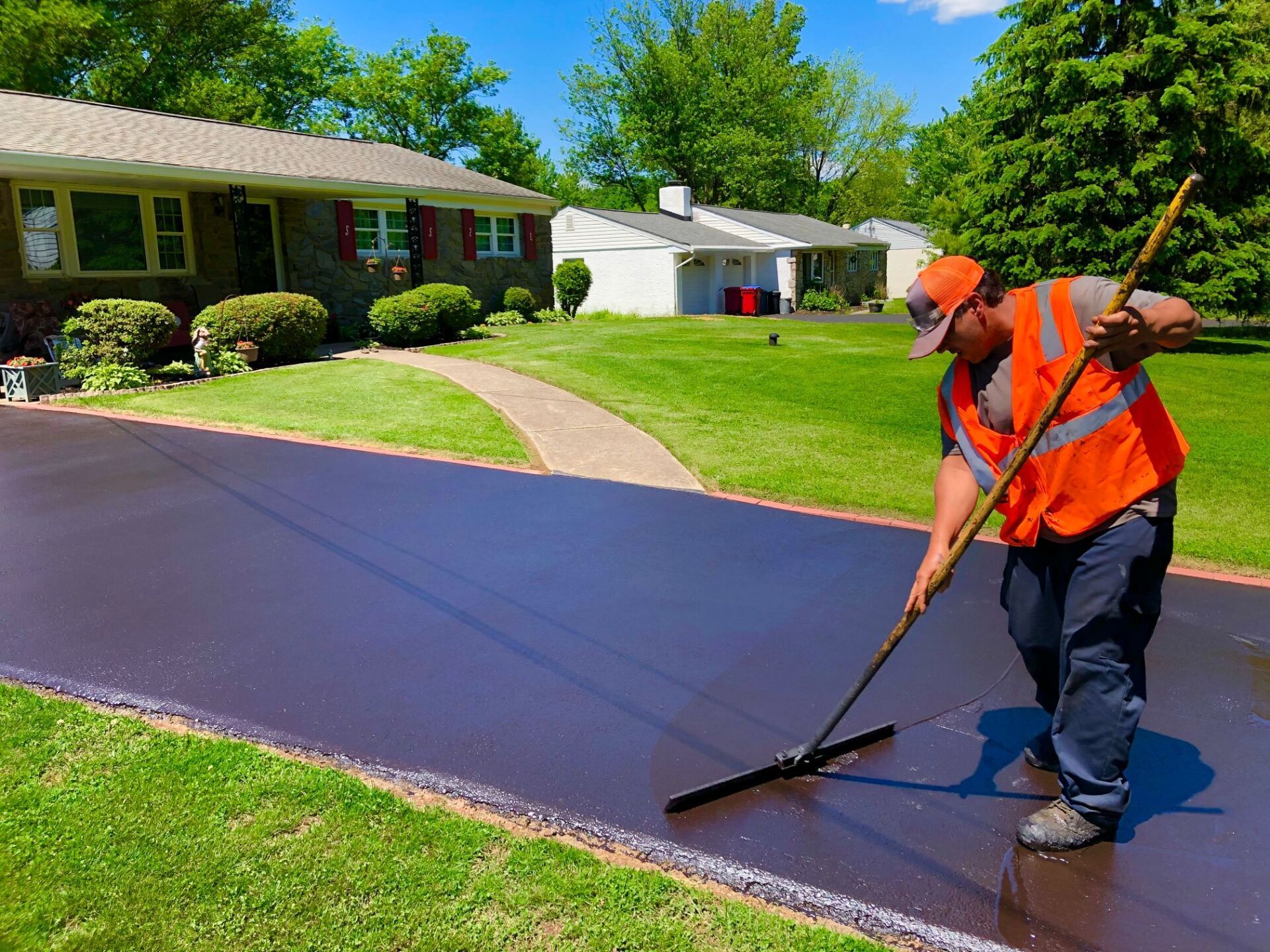Renew Your Home with Regrading and Asphalt Sealing Methods
Renew Your Home with Regrading and Asphalt Sealing Methods
Blog Article
Warm Mix Asphalt: A Lasting Remedy for Sidewalk
Hot Mix Asphalt (HMA) has actually emerged as a leading sustainable choice for pavement remedies, providing a myriad of innovative modern technologies and ecological advantages. Its ability to recycle products and reduce energy consumption presents a compelling case for its adoption in road building and construction tasks. In addition, the long-lasting performance and durability of HMA make it a preferred alternative for infrastructure development. As the demand for environmentally friendly construction practices grows, exploring the subtleties of HMA's sustainability can supply important insights into the future of sidewalk options.
Environmental Advantages of Hot Mix Asphalt

In Addition, Warm Mix Asphalt assists to mitigate city heat island results. Its dark color soaks up sunshine, reducing the quantity of heat showed back right into the environment compared to lighter-colored sidewalks. This can lower ambient temperatures in city locations, lowering the need for a/c and ultimately minimizing energy consumption.
In enhancement, Warm Mix Asphalt contributes to improved stormwater monitoring. Its porous nature permits water to recharge and infiltrate the pavement groundwater materials, minimizing overflow and the threat of flooding. These ecological advantages make Hot Mix Asphalt a sustainable option for leading roads and highways.
Energy Efficiency in HMA Manufacturing
Is power effectiveness an essential consider the manufacturing of Hot Mix Asphalt (HMA)? Absolutely. Power plays a significant role in the production of HMA, affecting both price and ecological sustainability. One vital facet of power effectiveness in HMA production is the use of warm mix asphalt (WMA) innovations (hot mix asphalt). WMA permits for the blending and positioning of asphalt at lower temperatures compared to standard warm mix asphalt, leading to minimized energy usage during production. This procedure not just reduces fuel use yet likewise reduces greenhouse gas emissions, making it a more eco-friendly alternative.
In addition, improvements in plant innovations have brought about more energy-efficient HMA production procedures. Modern plants are developed with features like recycled asphalt sidewalk (RAP) processing abilities, efficient heater systems, and improved insulation, all adding to energy cost savings. By enhancing power usage in HMA manufacturing, the market can reduce its carbon impact while preserving top quality sidewalk materials. Power efficiency is, therefore, a crucial factor to consider in guaranteeing the sustainability of Warm Mix Asphalt production.
Recyclability of Warm Mix Asphalt
The recyclability of Warm Mix Asphalt (HMA) is a critical element of its sustainability and long-term environmental influence. HMA is among one of the most recycled products in the United States, with over 100 million heaps of redeemed asphalt sidewalk (RAP) being recycled yearly in brand-new sidewalk construction. Reusing HMA offers a number of ecological advantages, such as reducing the need for virgin products, lowering energy consumption during production, and reducing the amount of waste sent out to land fills.
The process of recycling HMA entails grating the existing pavement, crushing it right into smaller sized pieces, and mixing it with new accumulation and asphalt binder to develop a recycled mix. Generally, the recyclability of HMA plays a considerable function in promoting sustainable techniques within the sidewalk market.

Long-Term Performance of HMA
Asphalt pavements demonstrate durability and durability over an extended duration, reflecting the lasting performance of Warm Mix Asphalt (HMA) Furthermore, advancements in HMA innovation, such as the use of polymer-modified binders and cozy mix asphalt, have actually additionally improved the durability and durability of HMA sidewalks. By prioritizing top quality construction and upkeep methods, go to my blog HMA proceeds to show itself as a economical and sustainable option for long-lasting pavement facilities.

HMA: Sturdiness and Sustainability
Demonstrating both durability and sustainability, Warm Mix Asphalt (HMA) has ended up being a cornerstone in the building and construction of resilient pavement frameworks - angled parking. HMA's durability stems from its capability to endure hefty loads, rough climate condition, and high web traffic volumes, making it a reliable option for roadways, highways, and airport terminal runways. The composition of HMA, which usually includes accumulations, binder, and filler, plays an important duty in improving its longevity and resistance to damage
In addition, HMA's sustainability hinges on its recyclability and energy-efficient manufacturing procedure. The ability to reuse redeemed asphalt sidewalk (RAP) in new HMA blends reduces the need for virgin get more products and minimizes the ecological influence of pavement building and maintenance. Furthermore, the power performance of producing HMA depends on its over here reduced blending temperature levels compared to other sidewalk products, causing minimized power usage and greenhouse gas exhausts.
Conclusion
In conclusion, hot mix asphalt (HMA) uses a lasting solution for pavement with its ecologically friendly attributes. HMA's recyclability, power performance in manufacturing, and lasting toughness make it an eco-friendly choice for road construction. By conserving natural deposits, minimizing waste, and decreasing greenhouse gas exhausts, HMA plays a critical duty in advertising sustainability in framework growth. Its capability to minimize city warmth island impacts additionally highlights its relevance in developing ecologically mindful and resilient pavement systems.
HMA is one of the most recycled products in the United States, with over 100 million lots of reclaimed asphalt sidewalk (RAP) being reused yearly in brand-new pavement building and construction.The procedure of recycling HMA entails grating the existing sidewalk, crushing it right into smaller pieces, and blending it with new accumulation and asphalt binder to create a recycled mix.Asphalt sidewalks show toughness and durability over an extended duration, reflecting the long-lasting performance of Warm Mix Asphalt (HMA) Additionally, innovations in HMA innovation, such as the usage of polymer-modified binders and warm mix asphalt, have actually even more improved the durability and longevity of HMA pavements. The capacity to recycle recovered asphalt sidewalk (RAP) in new HMA combinations decreases the need for virgin materials and lessens the environmental effect of sidewalk building and upkeep.
Report this page